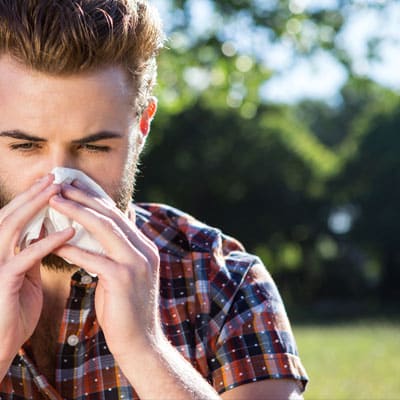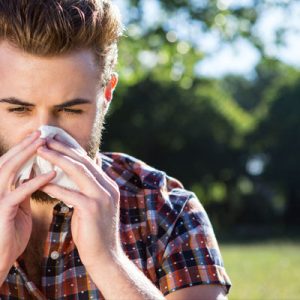It’s the hay fever season. Pollen counts are high and this means those who are prone to allergies are suffering with various symptoms, affecting one in five people at some point in their life. Hay fever (also known as allergic rhinitis or pollinosis) is a common allergic condition with an estimated 10 million people with hay fever in England alone.
Usually beginning in childhood or during teenage years, both men and women are equally affected but more likely if there is a family history of allergies, particularly asthma or eczema.
Symptoms of hay fever
The season and severity of each type of pollen changes each year according to weather conditions. Pollen released throughout the spring, summer and autumn contains proteins that can cause the nose, eyes, throat and sinuses to become swollen and sore and can originate from trees, grass and weeds. Symptoms can include sneezing, a runny nose and itchy eyes and can be mild or severe.
Diagnosing hay fever
If someone believes they have hay fever then it is advisable for them to keep a diary so that they can begin to understand the patterns of symptoms. For example, if symptoms start as early as January or February and continue until late March, it may be that they are allergic to early flowering trees, such as the hazel and alder.
A GP can refer a person for a skin prick test and/or blood test and the results will confirm which type or types of pollen set off hay fever. This is helpful in that a person then knows that they definitely have hay fever and not an allergy to something else.
Prevention and treatment of Hay fever
There is currently no cure for hay fever but most people are able to relieve symptoms with treatment. The most effective way to control hay fever is to avoid exposure to pollen.
- Avoid being outside when the pollen count is high (over 50)
- Wear wraparound sunglasses to stop pollen getting in eyes when outdoors
- Change clothes and take a shower after being outdoors to remove the pollen
- Speak to a GP or pharmacist about the various types of treatment available, depending on the severity of the hay fever
- Some treatments may include:
- Eye drops for treating itchy or watery eyes.
- Antihistamines to help prevent allergic reactions
- Nasal sprays to help to relieve inflammation
- Salt water (saline) solutions which can help clear and soothe the lining of the nose
- Some treatments may include:
Recommendation for employees with hay fever
- Personnel who work outside with severe allergies to pollens should discuss this with their manager
Recommendations for employers
- Ensure that information on hay fever is available for employees during high season
- If personnel report allergies to pollens which are affecting their ability to work outside, conduct a risk assessment and make changes where possible
- Review and assess any suitable improvements to employee work environments to minimise exposure to pollens.
QCS Heath & Safety policies
QCS have guidance and policies to support your service in meeting the requirements of health and safety.
Sally Beck RGN, BSc (Hons), MSc, CMIOSH – QCS Expert Health and Safety Contributor
References
www.nhs.uk/conditions/hay-fever/pages/introduction.aspx
www.asthma.org.uk/knowledge-bank-pollen-hay-fever-qa






